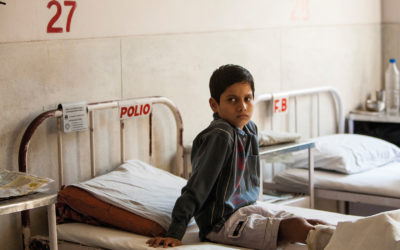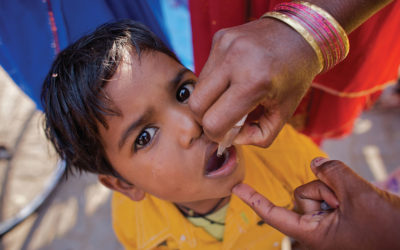The smell of the slums is an incredibly powerful one. It is a deep, gut-wrenching, nostril-filling, chemical stench of stale ammonia. It is an invisible smelling salt which packs the powerful punch of a heavyweight boxer to your solar plexus.
The pain to your senses is doubled by the squalor and human suffering which burns your eyes. Is the moistening around those eyes as you wander the pot-holed, narrow streets of this Delhi settlement a chemical reaction, or one carried by raw human emotion?
Wearing warm clothing against the early morning January chill, a stomach well fed by the feast of a recent hotel breakfast, and carrying an expensive iPhone to capture these soul-destroying moments, you feel ashamed by your own humanity.
Occasionally you hear overhead, but cannot see through the low-lying smog, the roar of aeroplanes landing at nearby Indira Ghandi International Airport.
And barely half a mile from the slum at Vasant Vihar lies a Skoda showroom, advertising expensive, flashy cars which would cost a lifetime’s wages to the humble folk of a place known as ‘spring settlement’.
From a nation with the fastest-growing trillion-dollar economy in the world, and the fifth largest economy in 2019, with a nominal Gross Domestic Product of $2.94 trillion – overtaking the United Kingdom and France – the paradox of poverty is perverse.
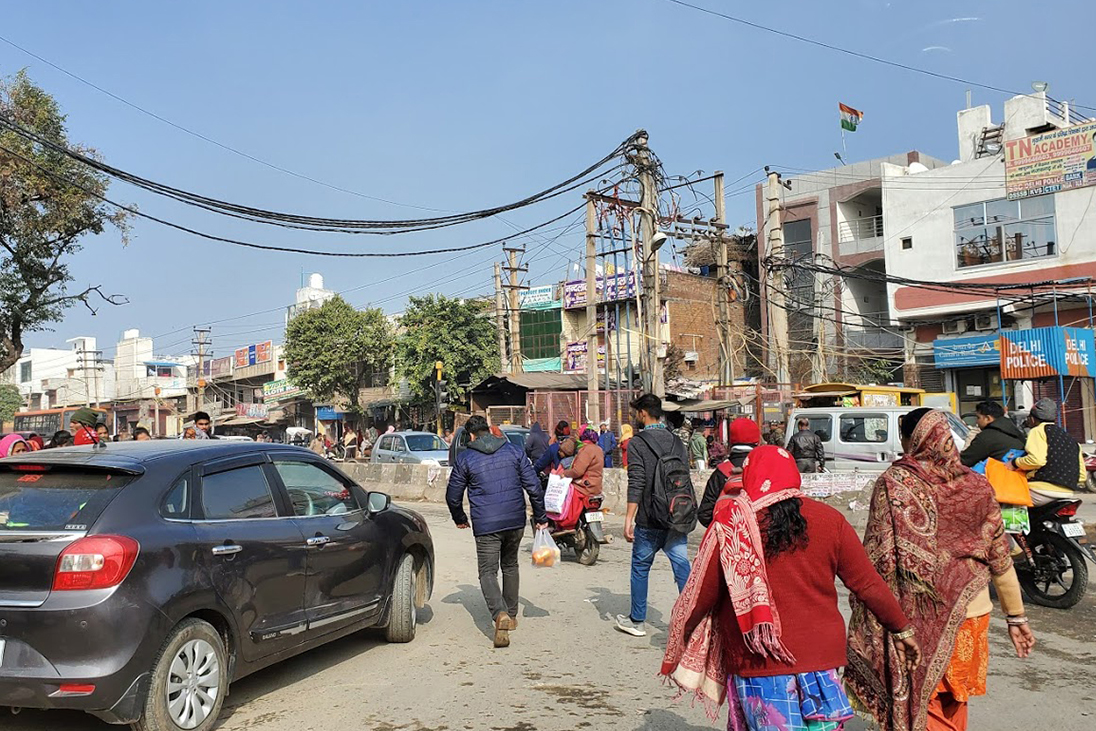

The battle against polio is taken to all villages
But for a country like India, settlements such as Vasant Vihar represent a menacing medical tinderbox, threatening a cherished six-year long, polio-free status at an instant.
Vasant Vihar is rammed with around 13,000 tiny homes, many shielded with a simple curtain as a marker to the front door. Most are temporary dwellings, some are built with brick or tin. Here, the sanitation is pitifully poor.
Water has to be carried, animals such as pigs, cattle and dogs forage freely on rubbish-filled open spaces, as folk scratch out a humble living.
It’s why settlements like Vasant Vihar are key targets for the Indian Government’s polio National Immunisation Day – a mass campaign, supported by Rotary International, held on a number of days each year when supplemental doses of the oral poliovirus vaccine are given to children to halt the transmission of wild polio viruses.
Speak to Deepak Kapur, Chairman of Rotary International’s PolioPlus Committee in India, and he knows just how vulnerable this nation of 1.37 people billion is to losing that cherished polio-free status. Near neighbours Pakistan and Afghanistan remain the last two countries on earth where polio is endemic.
He said: “We are literally sitting on a time bomb until Pakistan and Afghanistan are free of the virus. Polio does not need a passport, it has no borders. After all, what are these borders; they are just man-made lines.”
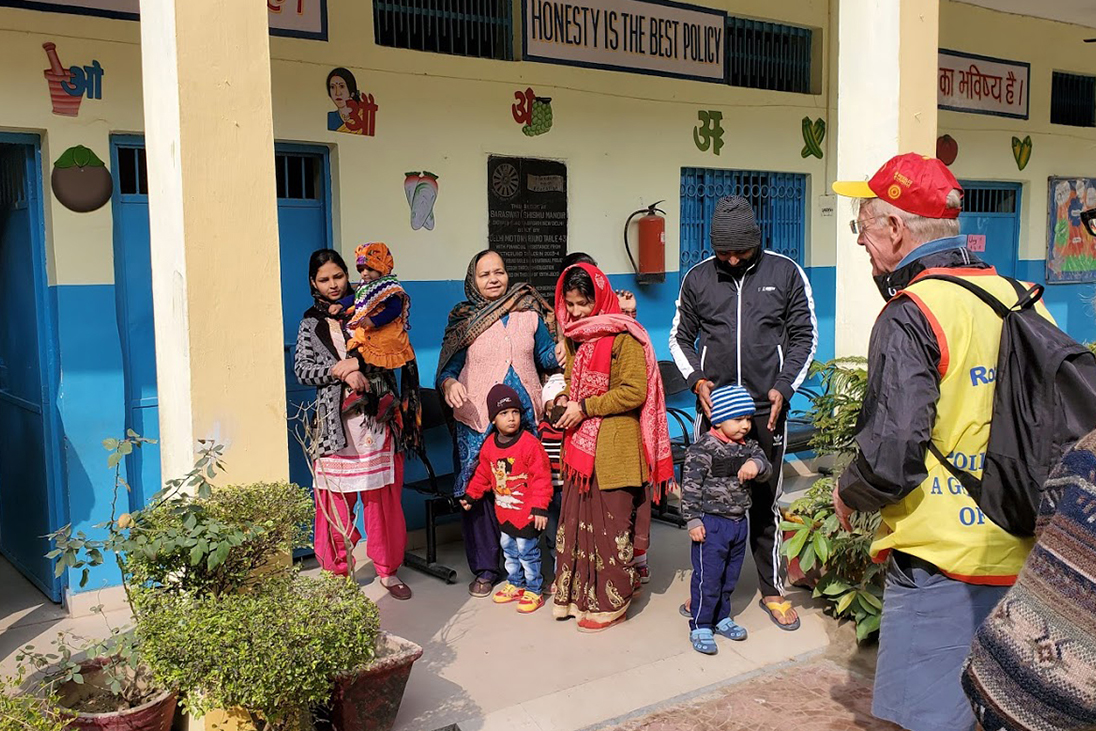

Rotarians helped families in Najafgarh
But what about conditions at home?
Deepak admits that India is looking down a yawning khud (chasm), because of its claustrophobic population density, along with insanitary conditions, impure drinking water, malnourishment, and enteric (stomach) diseases which still exist in some areas.
However, the Delhi Rotarian points to the state of Uttar Pradesh, which lies close to Nepal in northern India – the perennial bad boy of polio, where a World Health Organization official once warned: “The world will be polio-free only when India is polio-free, and that will only happen if Uttar Pradesh becomes free of polio.”
Deepak explained: “The reason we were able to get rid of polio in Uttar Pradesh, and some other endemic areas, is because they were literally drowned in an ocean of oral polio vaccine.
“The job has been done by the vaccine and by Rotary volunteers, with their catalytic role to ensure every child gets immunised.”
And so, on January 19th, 2020, Rotarians from around the world gathered in India on National Immunisation Day, or Polio Ravivar, to ensure the country’s 170 million children under the age of five were protected from this crippling disease.
Polio does not need a passport, it has no boundaries.”
From Great Britain & Ireland, there were two teams; one based in Delhi, and another in Amritsar in Punjab, just 15 miles from the Pakistan border. Based in the Indian capital were also Rotarians drawn from the USA, Canada, Belgium, Luxembourg, Japan and Barbados.
Their role, was to support health volunteers administering the couple of polio drops to each infant at health centres that Sunday. And then, the Rotarians worked with these tireless folk, armed with census details, in door-to-door follow-ups to ensure no child was missed.
“We work hard to make sure the polio virus never comes back,” said Neelam Devi, a 20-year veteran as a local health volunteer, who was knocking on doors in the market town of Najafgarh, some 15 miles south-west of Delhi.
Her task, with colleague Sudesh Kumani who were as part of 73 teams in the area, was to visit around 550 households in the next week.
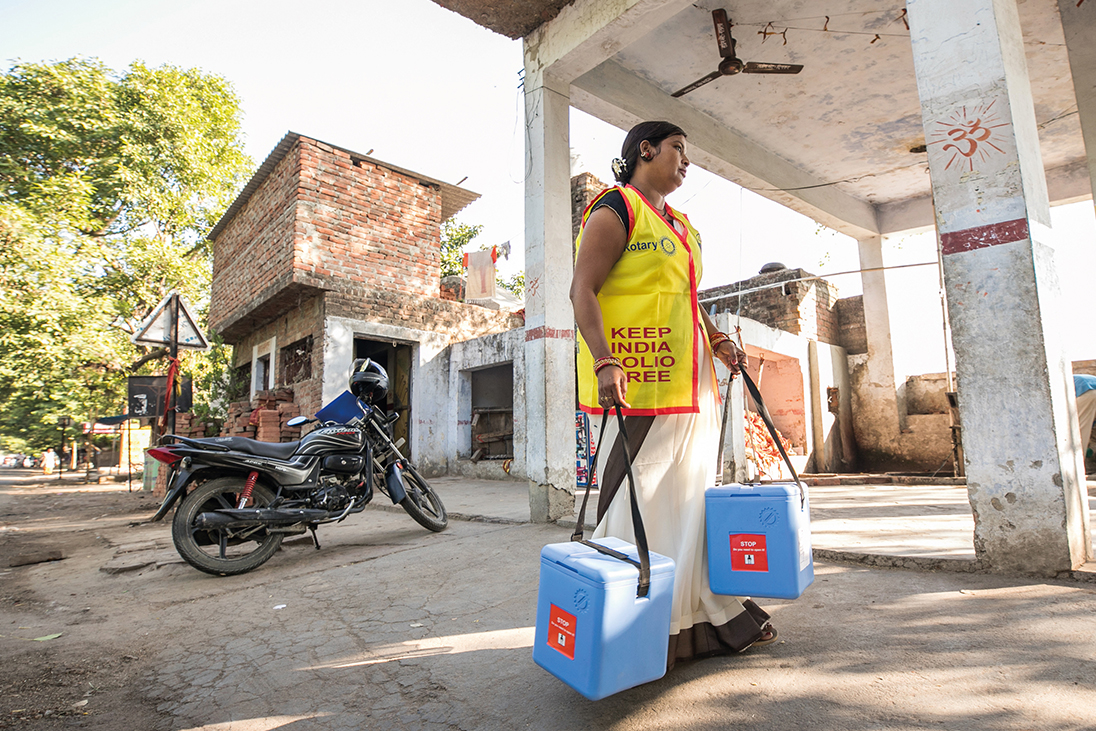

The polio vaccines are stored in cool boxes and distributed to health centres across India.
“Some people do say ‘no’ when we tell them they have to have their child vaccinated. They are afraid. But when we explain the polio drops are not harmful, they apologise and let us give the vaccine,” explained Neelam.
“I would say one in a thousand tell us absolutely ‘no, no’, so we refer the family to the hospital. We don’t miss anyone. We make sure every house is covered.”
Dr Dinesh Chawla, who was co-ordinating efforts in Najafgarh, explained they use newspapers, radio, loud speaker broadcasts, posters and social media to promote the polio campaign to parents.
Unlike in Pakistan, where health visitors have been shot dead, Dr Chawla, said his team were not placed in any danger. The health visitors are well known, and, besides dispensing polio drops, many help mothers with issues such as breast-feeding and mental health.
“Probably our biggest challenge is that people have become relaxed about polio,” he said. “They know polio is no more in India, and ask why we are still doing this? So we have to tell people why it matters.”
Lajwanti, a 25-year-old mother from Najafgarh, brought her 18-month-old daughter Hitiksha to the clinic at the Ekta Model School in Najafgarh. She has a 34-year-old friend crippled with polio, so knows full well of the dangers.
“It is terrible to see,” she said. “I want my daughter to be safe, so I had to come.
“We all know what can happen with polio, and all my family knows that too.”
Fact File: National Immunisation Days
• National Immunisation Days (NID) were organised by the Indian Government and other governments throughout the world following advocacy by Rotary and its partners at the World Health Organization
& UNICEF.
• Thousands of volunteers and health workers, together with Rotarians, canvas the streets throughout the country promoting the immunisations.
• Organising an NID in India is complex. The date has to be agreed by states to avoid clashes with state holidays or local elections.
• NIDs started in 1995 when Rotary clubs in India manned booths every six to eight weeks during the winter months. This became the most successful weapon against polio, resulting in India becoming polio-free from 2014.
• In 2006, Indian Rotarians’ resources were stretched, so they asked for help from overseas Rotarians. Rotary International funded a Rotary Polio Office in Delhi to co-ordinate the visits and direct volunteers to high risk cities.
Deepak Kapur describes India as ‘relieved’ to have been polio-free since January 13th, 2011, when the last wild virus polio case was detected in Bengal. Three years later, India was certified polio-free by the World Health Organization.
When you drown the polio virus in vaccine, it cannot float”
So what of the perverse paradox of poverty which threatens India’s polio-free existence? The Rotary chief admitted the Indian Government is making tremendous efforts to raise per-capita income, but this is going to be a long-term story.
“There is no easy way out,” admitted Deepak. “So what does a sad man do?
“Traditionally he goes to the pub and drowns himself in ale.
“When you read about the history of middle-age England, a lot of people would become dipsomaniacs. They would drown themselves in their own sorrows.
“When you drown the polio virus in vaccine, it cannot float. That is really the only full-proof effort.
“We have to keep immunising 170 million children, day in, day out, in India to keep the virus away, until Pakistan, Afghanistan and the rest of the world is free of polio.
“I certainly expect it to happen in my lifetime. I expected it to happen sooner, but we have just been held up by unsettled conditions in our two neighbouring countries.
“If the virus can be stopped and if every child gets the vaccine, there is no reason why it should not happen soon.”










